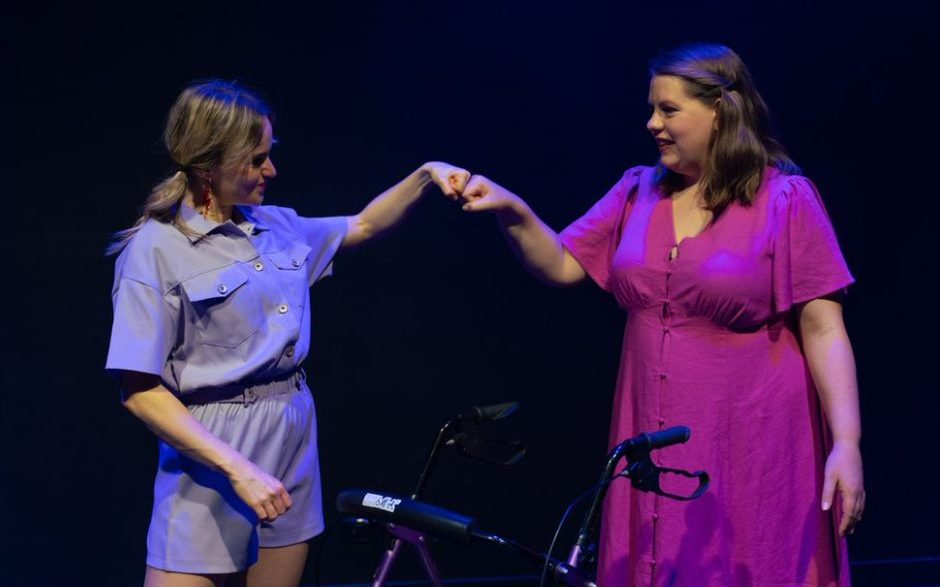After parking my mobility aid in a designated area, this writer mobilised to her seat using crutches and settled down in the intimate surrounds of the Diane Cilento Studio, Queensland Theatre. The sold-out world premiere of Betsy and I was housed in a welcoming space where mobility aids were aplenty and, like this reviewer, my tribe was ready and eager for what was about to unfold on the stage.
A wooden table and matching chairs were set up in a corner. A tea-set dominated the table top. Two cardboard boxes sat side by side in the middle of the stage (these sometimes doubled up as chairs during the play). Towards the back of the stage, an array of different sized cardboard boxes were haphazardly stacked on top of each other and were interspersed with a collection of colourful teapots. This clever, simple set-up completed the accessible set design by Jess Hansen.
The audience was introduced to Ivy (Alexandra Ellen) who suffers from a chronic illness and is about to move back in with her dad after her marriage break-up. To aid with her walking, Ivy inherits her grandmother’s purple wheelie-walker that she names Betsy and which comes to life in the (human) form of Sophie Kleinschmidt. Betsy is only visible to Ivy and together the two strike out on an adventure to find cake, visit the park and shop at Kmart.
Theirs is a tumultuous relationship, a contrast in personalities. Ivy is overcome with sadness, disillusionment and frustration reinforced by her disability. Betsy on the other hand oozes enthusiasm, energy and feistiness, and morphs into a petulant child when left alone. As they navigate their way together, Ivy is confronted by characters who will test her resilience, her patience and, above all, what it means to be defined by her disability.
Throughout the performance, a disembodied voice repeatedly asks the same question but at separate intervals: ‘If you had one wish, what would it be?’ To which Ivy wistfully answers ‘to be invisible’, ‘to have a voice’, ‘to be heard’, ‘to be content’, ‘to be respected’, ‘to thrive’. This voice resonated (strongly).
Writer/creator and performer Alexandra Ellen has devised an emotive semi-autobiographical script that delves deeply into themes surrounding ableism, shame, pride, identity, unconscious bias, inspiration porn, stereotypes and acceptance. Humour and honesty is at the forefront of her witty dialogue, even as the audience was confronted with the very real challenges a person with a disability faces – travelling on an airline, choosing accessible accommodation, finding disabled parking bays, navigating stairs, the perils of falling or confronting the end of a marriage. Ivy, with the help of her feisty mobility aid Betsy, learns to come to terms with her disability – she is emboldened by the realisation that neither her disability nor her wheelie-walker can define who she is and that she possesses the power to control the outcome of her life choices.
Kleinschmidt embodied her whimsical alter ego, Betsy, aka wheelie-walker-with-attitude and part life coach. She was clad in purple leather pants with matching purple/black jacket, a pair of quirky-looking lilac plaits and magical face glitter – Betsy’s jacket was a refreshing billboard in the making that read “disabled is not a dirty word” and “I’ve already tried yoga”, courtesy of costume designer Jess Hansen. Betsy’s enthusiastic guidance and help encourages Ivy to find the joy and pride in life where there was once only resentment and shame.
Cameron Hurry’s multifaceted onstage personas as Ivy’s dad, her ex-husband, her father-in-law, the Kmart security guard and the obnoxious stranger in the lift impressed this writer with his quick character changes. His various, nuanced roles personified the loving dad, the uncaring husband, the uninformed father-in-law and the trusting security guard. As the obnoxious stranger in the lift, Hurry’s vitriolic rhetoric towards Ivy was very realistic and highlighted the unsolicited microaggressions with which a person with a disability is forced to deal. Kudos to Ellen for being brave enough to share this fact.
Betsy and I presented a whirlwind of emotions wrapped up into a mere 60 minutes. Accordingly, the audience was reminded of the breakout room for time-out and also given a five-minute “tea” break midway to absorb the enormity of the script.
This writer had never attended a play that was Auslan interpreted. Nothing but praise for FAB Interpreting. Their mesmerising performance in translating this endearing script complete with facial expressions and character changes was truly admirable.
Read: Pushing limits and norms with ‘Sense of Place’
For those of us who require mobility aids, we indeed do form a deep bond and even a “relationship” with them. After all, they are special devices that are designed to assist a person who has a mobility impairment. But for those who did not get the memo, mobility aids do not define who we are!
Side note: Betsy and I was just one of several significant performances across theatre, dance, music and comedy that was showcased as part of the Undercover Artist Festival and in conjunction with the Brisbane Festival.
Betsy and I
Producer: indelabilityarts
Creator/Writer/Performer: Alexandra Ellen
Director: Cienda McNamara
Performers: Sophie Kleinschmidt, Cameron Hurry
Stage Manager: Helen Gillespie
Set and Costume Design: Jess Hansen
Sound Design: Sarah Claire Judd
Integrated Auslan Interpreters: FAB Interpreting
Betsy and I was performed on 21 September as part of the Undercover Artist Festival, presented in conjunction with the Brisbane Festival.
This review is published under the Amplify Collective, an initiative supported by The Walkley Foundation and made possible through funding from the Meta Australian News Fund.





